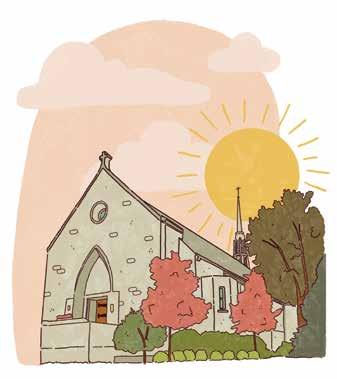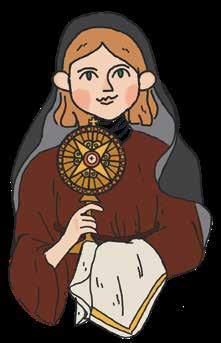
2 minute read
DID YOU KNOW?
1 Copper steeple
1 Wood reredos Distinctive modified Art Deco reredos combines a large central crucifix with smaller, elaborately gilded paintings of the Virgin Mary and St. John, each flanked with a decorative panel attached with hinges. During Lent the panels are closed.
Advertisement
“Our fish fry is known for its communal spirit – as a place to see neighbors and friends. Usually if someone comes, they stay the entire time! We have trouble turning over tables, people just don’t want to leave.” – Father George Jaquemin, pastor
“Many, if not most, of the parishioners are actively engaged in parish life and in the life of the neighborhood. St. Clare is really an anchor in the College Hill Community.” – Father George Jaquemin, pastor
When the Great Depression halted St. Clare Parish’s church construction, parishioners in College Hill celebrated Mass in the basement for more than 25 years. A temporary roof a few feet above street level was erected to cover the “Basement Church.”
May 29, 1910
Temporary church finished and dedicated.
1912
Sisters of St. Francis Oldenberg arrived. St. Clare School opened in their convent.

St. Clare
St. Clare was the first female Franciscan. A rich young woman who ran away from home to follow St. Francis, she founded the Order of Poor Ladies of San Damiano (now called the Poor Clares) to live the Franciscan life in different way from the friars, who wandered and begged. St. Clare is said to have repelled an invading army with a monstrance and, because she miraculously saw Mass on her wall when she was too ill to attend, she is the patron saint of television.
Sept. 5, 1909
25 families met at the Ohio Military Institute to discuss a new parish.
Oct. 3, 1909
The parish’s first Mass celebrated on the stage at College Hill Town Hall.
1915
School building dedicated.
1930
Rectory and basement of church built and roofed to use for Masses.
1955
Work on the church began again. It was designed by architect Edward Schulte in a style combining late-period Art Deco lines with an emphasis on spare wood elements and spare, empty space.
1957
Current church dedicated.
1964
German-made stained glass windows installed. They were based on the Benedicite canticle from the Book of Daniel used in the Liturgy of the Hours (“Oh all ye works of the Lord, bless ye the Lord”).
1987
First St. Clare Lenten fish fry, which continued until Covid-19 restrictions.
2006
New parish center built. School consolidated with several other local parishes at St. Bartholomew Consolidated School (now John Paul II).










